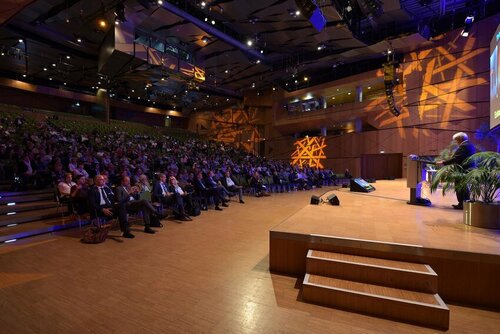![]()
30 September 2019
German perio society annual meeting focuses on aesthetics
Category:National Activities

Almost 900 periodontists and other dental professionals attended the annual meeting of the German Society of Periodontology (DG PARO), held in Darmstadt from September 19 to 21.
The topic of the meeting was “Aesthetics in Periodontology” and participants were able to learn innovative therapy concepts and novel approaches, as well as receive an update on recent research findings.
The first lecture, on ‘The anterior tooth with a deep periodontal pocket’, was given by Professor Wim Teughels (Leuven, Belgium), who emphasised the non-surgical treatment protocol of periodontitis and referred to the potential of the body’s own healing. Professor Hannes Wachtel (Munich, Germany) and Professor Martina Stefanini (Bologna, Italy) shared the stage and gave insights into their approaches to minimally invasive therapy.
The focus of the second session was the common aesthetic problems that result from periodontitis – recessions and “black triangles” in the anterior region – and how to tackle them with a restorative approach. Professor Gabriel Krastl (Wurzburg, Germany) presented his personal treatment cases in which he masked the aesthetic problem with composite restorations, and approach which he provided a long-term solution, satisfying the demands of both clinician and patient. Dr Johannes Boldt (Düsseldorf, Germany) introduced the audience to the prosthetic concept that is implemented in the University of Düsseldorf.
Dealing with these problems from a surgical approach was topic of the following session in which Professor Anton Sculean (Bern, Switzerland) focused on tunnelling techniques and Francesco Cairo (Florence, Italy) presented different flap designs.
Friday ended with a lecture series dealing with severely periodontally involved anterior areas. Professor Pierpaolo Cortellini (Florence, Italy) impressed the attendees with his patient cases, saving teeth with nearly 100% bone loss. Professor Stefan Fickl (Fürth, Germany) also impressed the audience with his cases but was more restrained on the extent of lesions that could be controlled and treated. In cases of tooth loss, Professor Henning Schliephake (Gottingen, Germany) presented approaches of bone and soft-tissue management to prepare a perfect implantation site.
Tackling implants
Saturday morning began by looking at the question of how to deal with aesthetically impaired dental implants. Dr Arndt Happe (Münster, Germany) concentrated on the positioning of implants and the impacts of wrong positioning on aesthetic outcomes. The importance of informed consent and dealing with patient expectation was addressed by Dr Rino Burkhardt (Zurich, Switzerland), while Professor Frank Schwarz (Frankfurt am Main, Germany) presented different approaches that can be deployed when confronted with peri-implant disease.
Addressing the treatment of cases with multiple missing anterior teeth, Dr Markus Schlee (Forchheim, Germany) dealt with methods to augment bony and soft tissue before implantation, concentrating on synthetic graft materials, while Dr Jochen Tunkel (Bad Öynhausen, Germany) focused on augmentation with autogenic bone-graft material and Professor Stefan Wolfart (Aachen, Germany) offered suggestions on the prosthetic restoration of implants in these cases.
The main programme of the meeting concluded with the session “DG PARO/European Association for Osseointegration (EAO) – Battle of Concepts”. Chaired by Prof Fickel, the session featured rival treatment concepts presented by Dr Laurence Adriaens (Gent, Belgium), Dr Sven Muehlermann (Zurich, Switzerland), and Dr José Manuel Navarro (Las Palmas, Spain). They discussed a broad variety of treatment options including regenerative approaches, classical prosthetic restoration, and implant treatment. The centre of attention during the session was a case presented (and subsequently treated) by Professor Fickl.
The meeting was aimed not only at clinicians but also provided professional-development options for all members of the team, with activities for dental assistants and dental hygienists, while researchers were able to present their latest work in poster presentations.
In addition, there were various hands-on workshops open to all participants. These covered topics including the manual sharpening of instruments, soft-tissue replacement to improve aesthetics, predictable approaches to anterior restorations with composite, the treatment of soft-tissue defects, combined periodontal/peri-implant therapy, and approaches to the periodontally compromised tooth.
New board
Before the annual meeting, the members of DG PARO re-elected their board. Professor Bettina Dannewitz took over the office of president for the next three years and Professor Henrik Dommisch was elected as president-elect. The secretary general Professor Holger Jentsch and treasurer Dr Lisa Hezel were confirmed in their posts and Professor Thomas Beikler was elected as a new member of the board.
Various prizes were awarded during the meeting: the DG PARO award for a doctoral thesis, the DG PARO/Meridol research grant, the DG PARO Eugen-Fröhlich-Prize, and the implant research prize.
Summing up the event, congress president Professor Moritz Kebschull (Birmingham, UK) said that the meeting had addressed the question “How can we preserve or even optimise the aesthetic appearance of our patients with periodontitis without compromising on our goal to minimise probing depths as the most important surrogate for future tooth loss, as well as inflammation as the link between periodontal and systematic diseases?”
“In this annual meeting, this challenging question was addressed by a cutting-edge group of clinicians, focusing on different clinical situations ranging from single deep pockets in the anterior to the loss of multiple teeth in the aesthetic zone with the need for demanding interdisciplinary treatment. The meeting was wrapped up with a unique session in collaboration with the EAO that showcased the pros and cons of different treatment approaches.”
Prof Dannewitz added: “Knowledge is only good if you share it! Our annual meeting in Darmstadt was an excellent event to share knowledge, to meet, and learn from some of the most renowned experts in their fields and to discuss with colleagues and friends. I am particularly grateful to all speakers and the whole organising committee, who contributed to the great success of our congress.”




